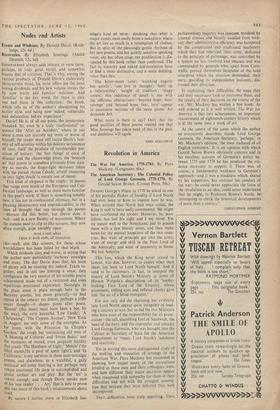Revolution in America
The Wm; for America, 1775-1783. By Piers Mackesy. (Longmans, 60s.)
DURING George's illness in 1778 he asked in one of his periodic flashes of lucidity if Lord North had ever been to Kew to inquire how he was. When assured that North had once called, the King is said to have sadly commented, 'He might have recollected me sooner. However, he, poor fellow, has lost his sight and I my mind. Yet we meant well to the Americans, just to punish them with a few bloody noses, and then make bows for the mutual happiness of the two coun- tries. 'But want of principle got into the army, want of energy and skill in the First Lord of the Admiralty, and want of unanimity at home. We loSt America.'
This loss, which the King never ceased to lament, was due, however, to causes other than these, not least to Lord North himself. And it used to be customary, in fact, to interpret the history of Lord North's Ministry in terms of Horace Walpole's descriptions of its 'booby- looking' First Lord of the Treasury, whose prominent, rolling eyes and inflated cheeks gave him 'the air of a blind trumpeter.'
For not only did the charming but evidently lazy Lord North appear quite incapable of lead- ing a country at war, but so did the two Ministers who bore most of the responsibility for its prose- cution—the tall, shambling Earl of Sandwich, the head of the navy, and the unpopular and unlucky Lord George. Germain, who was brought into the Cabinet as Secretary of State for the American Department to 'repair Lord North's indolence and inactivity.'
Yet in writing this most distinguished study of the making, and execution of strategy in the American War, Piers Mackesy has succeeded in showing how unjust many of the accusations levelled at these men and their colleagues were, and how different their major decisions appear when reassessed with sympathy for them in their difficulties and not with the arrogant assump- tion that because they were defeated they were incompetent.
Their difficulties were truly appalling. Their
parliamentary majority was insecure, troubled by internal stresses and bitterly assailed from with- out; their adiffinistrative efficiency was hampered by the complicated and traditional, machinery Which they had inherited; their army, dedicated to the principle of- patronage, was controlled by a system no less involved and obscure and was commanded by generals who, apart from Corn- wallis, proved themselves incapable of the bold enterprise which the situation demanded; their navy, guarding its independence jealously, dis- trusted their direction.
In explaining their difficulties, the steps they and their successors took to overcome them, and the results of their decisions on the course of the war, Mr. Mackesy has written a fine book. As well ordered as it is well written, The War for America is that rare achievement, an important • reassessment of eighteenth-century history which is at the same time a work of art.
At the centre of the scene which the author so evocatively describes, stands Lord George Germain, the American Secretary, 'perhaps,' in Mr. Mackesy's opinion, 'the most traduced of all English statesmen.' It is an opinion with which Gerald Saxon Brown obviously concurs and in his excellent account of Germain's policy be- tween 1775 and 1778 he has produced the evi- dence necessary to support it. There was, of course, a fundamental weakness in Germain's approach—and it was a weakness which, shared by his supporters, has overcast his conduct of the war—he could never appreciate the force of the revolution as an idea, could never understand that he might, in Professor Brown's Words, be 'attempting to check the historical developments of more than a century:.
CHRISTOPHER HIBBERT


































 Previous page
Previous page